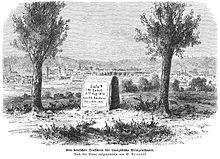Lulustein
The Lulustein (also Napoleon Stone ) is a memorial stone for Napoléon Eugène Louis Bonaparte in Saarbrücken . The memorial is located in the street Lulustein on the back of the sports and festival hall of the ATSV Saarbrücken in the district of Alt-Saarbrücken on the Bellevue .
history
According to oral tradition, the 14-year-old Napoléon Eugène Louis Bonaparte, nicknamed "Lulu", fired a cannon for the first time on August 2, 1870 at the beginning of the Franco-German War here on the parade ground in Saarbrücken . The spot also marks the furthest advance of the French army. French troops under Frossard had occupied the strategically important hill and shot at the new bridge (today's Luisenbrücke), the train station in St. Johann and the Prussian troops who had withdrawn to the resting place from here. The French advance was directed against the central Saar. Old Saarbrücken was occupied. Emperor Napoleon III. himself followed the actions of his troops with his fourteen-year-old son. The Prussian advance command was eventually expelled from Saarbrücken. Four days later, on August 6, 1870, the French were defeated in the Battle of Spichern .
Memorial stone

The idea of setting a stone at this point came from the veteran of the Wars of Liberation, HH Baumann from Bremen, who visited the battlefields after the war. The following inscription was written on the original stone: Lulu's first debut 2nd August 1870, err. v. HH Baumann, Vet. V. 1814-1815. In the picture in the " Gazebo " you can see the unobstructed view from the Lulustein to the Saar cities, Malstatt on the left , the train station in St. Johann in the center and Alt-Saarbrücken on the right. In the meantime, the former parade ground has been completely built up and incorporated into the residential area of Alt-Saarbrücken.
Together with the site of the Battle of Spichern, the Lulustein became a popular destination for tourists . In the "Gazebo" from 1871 you can read that numerous pieces of stone have already been chopped off as souvenirs. In 1914 the stone was described as "renewed several times". The stone with the inscription to France originally stood. Later it was moved a few meters and rotated 180 degrees so that the inscription can be seen from the street. The current Lulustein made of black granite bears the inscription "Lulustein 2nd August 1870 VV"
Legend
Lulu's debut refers to a legend: Napoleon III. took his son Lulu with him on the campaign at the age of 14 so that he could learn the craft of war from scratch. He should follow his great ancestor early on so that, as his father hoped, little Napoleon could one day become a great one. When they arrived in Saarbrücken, in enemy territory, the two encountered resistance for the first time. Napoleon told his son Lulu that it was now time for the first lesson, firing a cannon. Lulu passed this very well. However, the training could then not go any further because it was then reduced. Therefore, Lulu could not complete the military training, which can then be assumed as the reason that he had to die such a sudden death in Africa. The Kladderadatsch also published a satirical poem on August 7, 1870:
The first lesson
Saarbrücken fell. Triumph! Victoire!
HE and HIS little son was there!
The first leaf of the new Gloire,
it is plucked with cheers.
How wonderfully my balls ignite!
How firmly my army has proven itself!
I spat out of twenty-three gullies
Death upon an - open city!
O beautiful deed! How high the flames
rose from the roofs all around!
How we shot the nest together!
How funny it smokes right and left!
Listen, little sons, how in a sudden fall the
walls and beams crack!
The pitch wreath on the temple avenue!
Yes, yes, my son, that's how it's done!
There lie with paralyzed tongue
The enemies rattling, body to body;
And there - well, be happy, my boy! -
Child and woman lie in layers.
An old man limps there
, heavily laden from years
- try it and go!
A little practice can't hurt - that's
right! You already meet very well!
At the window - take a good distance -
look there, a young woman's face!
A good shot is a good chance - Take it
, my son, don't shiver!
You stand protected yes. Always
bolder, before the target point has escaped!
You procrastinate - Practice makes
perfect - you tumble! - Bravo, dear son!
There staggering - you would easily miss him -
a deadly miracle man walking along
how the poor hero must torment himself!
Give, boy, my Chassepot ago,
That I put the coup de grace
to the guy - he grieves me the man -
as he snaps like a fish in nets!
God take care of his soul!
That's how it's done, my dear little son!
Take note of what I have taught you.
You must shoot yourself your little crown
now - show yourself worthy of your father!
Saarbrücken fell - triumph! Victoire!
Paris rises with a shout of joy,
And so calls to Me as you to Gloire:
HE and Lulu were there too!
Individual evidence
- ^ Friedrich Köllner, Adolf Köllner, Albert Ruppersberg: History of the former county of Saarbrücken. III. Part: History of the City of Saarbrücken. 2nd volume, 2nd edition. (Reprint: Verlag Saarbrücker Bücher, St. Ingbert 1979, ISBN 3-921815-04-5 )
- ↑ Poem text at University Library of Heidelberg
literature
- GA: Lulustein on Exercirplatz near Saarbrücken . In: The Gazebo . 1871, p. 760 ( full text [ Wikisource ]).
- Albert Ruppersberg : History of the City of Saarbrücken. Volume 2, reprint of the 2nd edition from 1914, p. 77.
See also
Coordinates: 49 ° 13 ′ 40.6 ″ N , 6 ° 58 ′ 28.6 ″ E

